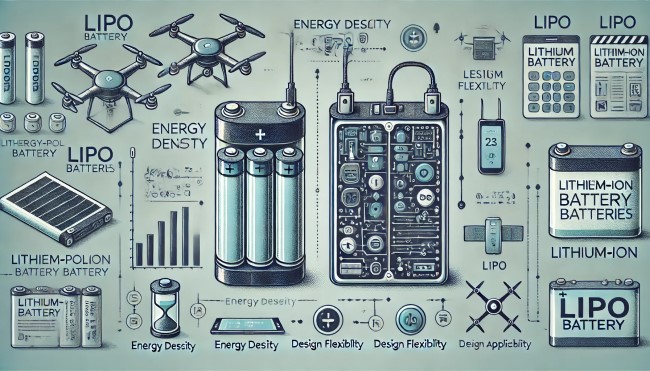Li-Polymer Battery vs Lithium-Ion Battery: A Comprehensive Comparison for Modern Devices

In an era where portable electronic devices are indispensable, the choice of battery technology can significantly impact the performance and lifespan of gadgets. Two of the most popular battery types are lithium-ion (Li-ion) and lithium-polymer (LiPo). This article delves into the key differences, advantages, and drawbacks of Li-polymer batteries versus lithium-ion batteries to help you make an informed decision for your needs.
What is a Li-Polymer Battery?
A lithium-polymer (LiPo) battery uses a polymer electrolyte instead of a liquid one, which is typically found in lithium-ion batteries. This polymer is either solid or in a gel-like state, offering a unique set of properties that set LiPo batteries apart from other types.
Advantages of Li-Polymer Batteries:
- Design Flexibility: LiPo batteries can be molded into a variety of shapes and sizes, making them ideal for compact and uniquely designed devices.
- Lightweight Structure: These batteries are generally lighter than their Li-ion counterparts, a significant advantage in applications where weight is a crucial factor, such as drones or wearables.
- Lower Risk of Leaks: The absence of liquid electrolyte reduces the risk of leakage, enhancing the safety profile of LiPo batteries.
Disadvantages of Li-Polymer Batteries:
- Lower Energy Density: Typically, LiPo batteries offer slightly less energy density than Li-ion batteries. This can mean shorter usage times between charges.
- Higher Cost: The production of LiPo batteries can be more expensive due to the specialized materials and processes required.
What is a Lithium-Ion Battery?
Lithium-ion (Li-ion) batteries are commonly used in a wide range of devices, from smartphones to electric vehicles. They utilize a liquid electrolyte to facilitate ion movement between the anode and cathode, enabling efficient energy storage and release.
Advantages of Lithium-Ion Batteries:
- Higher Energy Density: Li-ion batteries are known for their superior energy density, which translates to longer battery life and extended device operation.
- Mature Technology: Li-ion batteries have been in production for decades and are backed by extensive research, ensuring reliable performance.
- Cost-Effective Production: Due to their widespread use, the manufacturing processes for Li-ion batteries have become cost-efficient.
Disadvantages of Lithium-Ion Batteries:
- Risk of Leakage and Safety Concerns: Li-ion batteries contain liquid electrolytes, which can pose a risk of leakage if the battery is damaged. This can lead to potential hazards like overheating or fire.
- Limited Lifespan: Li-ion batteries tend to degrade faster over time, particularly when subjected to high temperatures or frequent charging cycles.
Li-Polymer Battery vs Lithium-Ion Battery: Key Differences
Now that we understand the characteristics of both battery types, let’s compare them based on several crucial aspects.
1. Energy Density
Lithium-Ion Batteries: These have a higher energy density, meaning they can store more energy for the same size compared to LiPo batteries. This makes Li-ion batteries preferable for devices requiring long battery life, such as smartphones and laptops.
Li-Polymer Batteries: While improvements have been made, LiPo batteries generally have a lower energy density. However, their flexibility in shape allows manufacturers to optimize the internal space of devices to achieve comparable energy storage.
2. Safety and Stability
Lithium-Ion Batteries: The use of liquid electrolytes increases the risk of leakage and thermal runaway, potentially leading to fire hazards. Advanced designs have mitigated some of these concerns, but risks still exist.
Li-Polymer Batteries: The solid or gel-like electrolytes in LiPo batteries make them more stable and safer than Li-ion batteries. The reduced risk of leaks and thermal issues enhances their reliability, especially in compact or handheld devices.
3. Design and Customization
Lithium-Ion Batteries: These batteries come in fixed rectangular shapes due to the rigid design of their casings. This limitation can restrict their use in devices with unique space constraints.
Li-Polymer Batteries: LiPo batteries can be molded into various shapes and sizes, providing greater design flexibility. This advantage is particularly useful for devices where form factor is crucial, such as wearables and portable gaming devices.
4. Cost of Production
Lithium-Ion Batteries: The established production methods for Li-ion batteries make them more affordable, contributing to their widespread use in consumer electronics.
Li-Polymer Batteries: The specialized production process of LiPo batteries often results in higher costs. The use of advanced materials and tailored manufacturing adds to the expense.
Applications of Li-Polymer and Lithium-Ion Batteries
Lithium-Ion Batteries: These are commonly used in products where high energy density is a priority. Popular applications include:
- Smartphones
- Laptops
- Tablets
- Electric Vehicles
Li-Polymer Batteries: LiPo batteries are chosen for applications that prioritize lightweight design and customizable shapes. Examples include:
- Drones
- Wearable Devices
- Portable Gaming Consoles
- Remote-Controlled Vehicles
Li-Ion Battery vs Lithium Polymer Battery: Which is Better?
The decision between a lithium-ion and a lithium-polymer battery ultimately depends on the specific needs of the device or project. If longer battery life and cost-effectiveness are priorities, lithium-ion batteries are generally the better option. Their higher energy density and established reliability make them ideal for mainstream electronics.
On the other hand, if safety, lightweight construction, and design flexibility are more critical, lithium-polymer batteries are the preferred choice. They offer enhanced safety features due to the absence of liquid electrolytes and can be tailored to fit into uniquely shaped devices.
Conclusion: Making the Right Choice
Choosing between a Li-polymer battery and a lithium-ion battery requires an understanding of the priorities for your device. Li-ion batteries excel in providing high energy density and cost-effectiveness, making them perfect for general consumer electronics. Conversely, LiPo batteries offer unmatched design flexibility and a safer profile, suited for innovative devices that need custom form factors.
In the fast-evolving world of battery technology, both types will continue to play significant roles. Weighing their strengths and limitations ensures you select the best option for your specific application.


